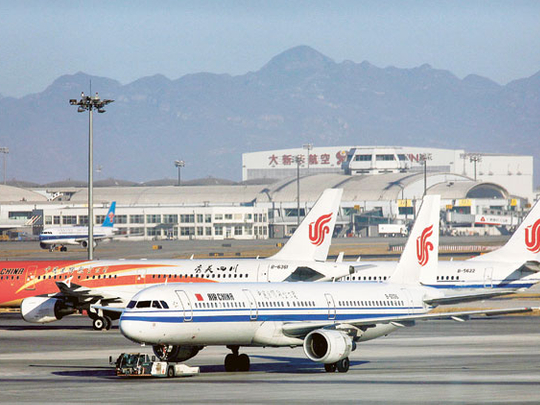
The recent imposition of the European Union's emissions trading scheme (ETS) — which requires airlines to pay carbon tax when using Europe's airports or airspace — has been reluctantly accepted by many global airlines.
It has been less well accepted by others, including the United States, India, China and Saudi Arabia, who have flatly refused to pay the tax. China has gone one step further, barring its airlines from complying with EU demands altogether. Beijing is unhappy that the EU acted unilaterally, imposing the tax without consulting the International Air Transport Association (IATA).
EU silence
The EU has been unusually silent about Beijing's stubbornness, the result of which is that Chinese airlines continue to use European airspace at no added cost. At the same time, other airlines — including Arab companies — have been forced to add surcharges on ticket prices, hitting consumers in the pocket.
It is a fair assumption that Europe's silence is linked to its need for China's help in other fields. On her visit to China earlier this month, German Chancellor Angela Merkel tried to convince the Asian giant to help the Eurozone out of its current crisis, particularly in regard to Italy and Greece. China has increasingly appeared open to such overtures, no doubt motivated by its strong economic and commercial ties to Europe.
In fact, Europe is now seeking money in various ways. Prior to the introduction of carbon tax — under the pretext of curbing pollution — European countries increased visa fees significantly in the past three years. As a result of this unjustified increase, the cost of visas for Britain alone have increased three times.
It is almost as if Europe has constructed a large moneybox along its borders, requiring anyone who travels to or through it to contribute a few dollars. The fees may seem relatively small compared to the price of an airline ticket, but the final figure is not. Europe is expected to collect between $3 and $4 billion (Dh11 billion to Dh14.6 billion) from the tax — a significant sum which the EU desperately needs to help it solve its financial crisis.
The emissions tax has nothing to do with protecting the environment, as the European Union claims. It is just a matter of money. If environmental protection was the issue, Europe would have cooperated with IATA and other countries in passing an international law imposing this tax in all countries. The environmental issue does not concern a certain continent, but it is an issue that concerns every country and is of great importance to sustainable development in both rich and poor countries.
This was the approach adopted by Europe more than a decade ago to rally support for the Kyoto Protocol on carbon emissions that aimed at fighting global warming. At that time, Europe was not suffering from a crisis but was at the highest point of its economic prosperity, recently having launched its single currency.
All this raises the question of how long China will continue to sing outside the flock and act beyond the scope of the European tax.
Will this issue be solved with the end of the EU debt crisis? Or will China persuade other countries, including the European ones, like Russia, to stand against what is considered a European act that aims to make airline companies bear a portion of financial burdens resulting from crises created by the Europeans themselves.
Tug of war likely
It is obvious that there will be a tug of war between China and EU over airline emission charges that will be mainly governed and determined by mutual interests that may be subject to bargaining between more than one party.
However, the continuous European silence over China's refusal to pay the EU emissions tax and allow its aircraft to fly freely over Europe's airspace is unacceptable and an injustice to other airlines. It also affects the credibility of the EU, which has always prided itself on having free markets and fair competition.
Dr Mohammad Al Asoomi is a UAE economic expert and specialist in economic and social development in the UAE and the GCC countries.












